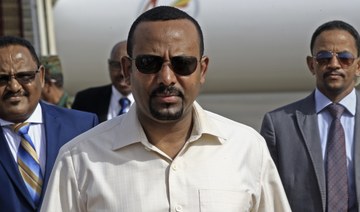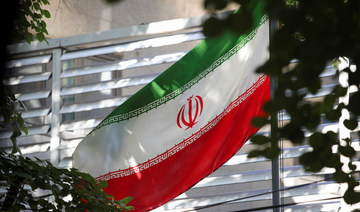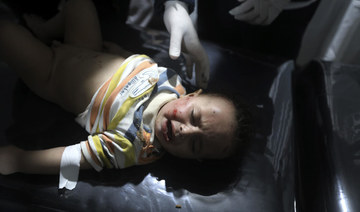ADDIS ABABA: Ethiopia held a memorial on Tuesday for the army chief of staff slain with four other senior officials in weekend attacks that posed the biggest threat yet to the prime minister's reforms.
Abiy Ahmed, who survived a grenade attack at a rally in his honour last year, sat in the front row at the memorial and wiped tears from his eyes with a white handkerchief.
Abiy took power 15 months ago and has won widespread international praise for kickstarting political and economic reforms. But his shake-up of the military and intelligence services has earned him powerful enemies at home.
His government is also struggling to contain discontent from Ethiopia's myriad ethnic groups fighting the federal government and each other for greater influence and resources.
The foiled plot to seize control of the northern Amhara region and the assassinations in the national capital Addis Ababa underscored the threat of spiralling violence in Africa's second-most populous nation.
In addition to the killing of the chief of staff in the capital, Amhara state president Ambachew Mekonnen and an adviser were killed in the region's main city Bahir Dar.
The attacks were led by Amhara's head of state security General Asamnew Tsige, who had been openly recruiting fighters for ethnic militias in a state that has become a flashpoint for violence.
Asamnew, the alleged coup plotter, was shot on Monday near Bahir Dar, according to the prime minister's office. He had served nearly a decade in jail for a previous coup plot, but was released as part of an amnesty last year.
RISKS
Hundreds of soldiers and officers in uniform gathered for the ceremony in a huge hall in central Addis Ababa.
Roads in the capital were blocked for the ceremony and security was tight. Access to the internet appeared to be blocked across Ethiopia for the third straight day, users reported.
The coffins of army chief of staff Seare Mekonnen and a retired general, both shot dead on Saturday by Seare's bodyguard in the national capital Addis Ababa, were wheeled into the hall, draped in Ethiopian flags.
Photographs of the men in formal military dress were adorned with yellow roses. Seare will be buried in his home region of Tigray on Wednesday.
At the memorial, the army's deputy chief of staff General Birhanu Jula spoke of the chief of staff's bravery in the guerrilla war against the Communist Derg regime that was toppled in 1991, and of his leadership role in Ethiopia's war against neighbouring Eritrea in the late 1990s.
The weekend killings came as Ethiopia prepares to hold parliamentary elections next year, although the electoral board warned this month that they were behind schedule and that instability could delay polling.
SECURITY FORCES
Ethiopia's ruling coalition, itself a grouping of ethnically-based parties, is facing an unprecedented challenge from strident ethno-nationalist parties, global think-tank Crisis Group said in a briefing note on Tuesday.
Asamnew, who allegedly orchestrated the killings, had been appointed by state authorities as regional security chief in an effort to claw back support from Amharas supporting more his more hardline policies, including expansion of Amhara's borders, the group said.
"The 22 June killings confirm the dangers in handing security portfolios to hardliners like Asamnew who are ready to pander to extreme ethno-nationalists, from whichever of Ethiopia’s ethnicities," the note read.
Ethiopia analysts say the prime minister must tread carefully to restore security. Too strong a response risks derailing his reforms and angering a polarised population. But failure to punish those responsible could see violence could spiral out of control.
Mehari Taddele Maru, an independent Ethiopian analyst, said the government should channel public anger through dialogue, but if ethnic rivalries spread to the federal armed forces, that could destroy the state, he said.
Ethiopia pays tribute to slain military chief
Ethiopia pays tribute to slain military chief
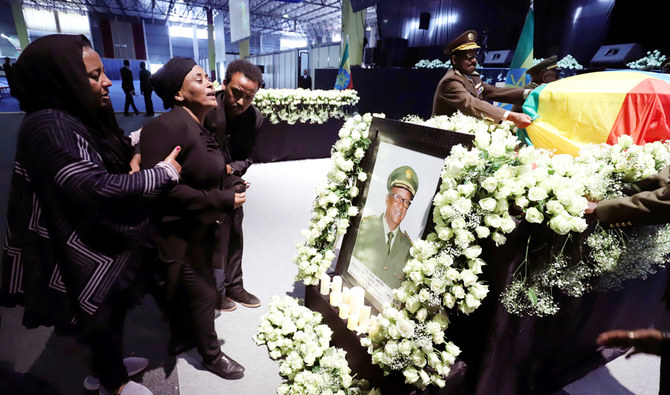
- Hundreds of soldiers and officers in uniform gathered for the ceremony in a huge hall in central Addis Ababa
New UK sanctions target Iranian drone industry
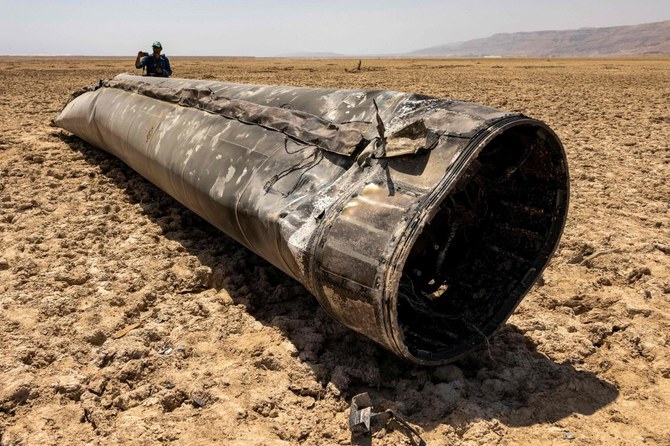
- The measures, taken in co-ordination with the US and Canada, target four businesses and two directors at a network of drone companies
LONDON: Britain on Thursday announced new sanctions targeting Iran’s military drone industry, in response to Iran’s drone and missile attack on Israel earlier this month.
The measures, taken in co-ordination with the US and Canada, target four businesses and two directors at a network of drone companies with the aim of limiting Iran’s ability to launch drones.
“The Iranian regime’s dangerous attack on Israel risked thousands of civilian casualties and wider escalation in the region,” British Foreign Secretary David Cameron said in a statement.
“Today the UK and our partners have sent a clear message – we will hold those responsible for Iran’s destabilising behavior to account.”
Britain also said it would introduce new bans on the export of drone and missile components to Iran, seeking to limit its military capabilities.
Last week, Britain imposed sanctions on Iranian military figures and organizations, in another coordinated move with the United States, following Iran’s action against Israel.
Iran launched drones and fired missiles at Israel on April 13 as a retaliatory strike for the attack on its embassy compound in Damascus two weeks prior, raising the risk of further escalation in conflict in the Middle East.
Egypt, Dutch leaders discuss Gaza ceasefire efforts

- Rafah assault ‘will have catastrophic consequences on regional peace and security,’ El-Sisi warns
- Egypt’s president and the Dutch prime minister agreed on the urgency of working toward reaching a ceasefire
CAIRO: Egypt’s President Abdel Fattah El-Sisi has discussed efforts to reach a ceasefire in Gaza with Mark Rutte, prime minister of the Netherlands.
During a phone call from Rutte on Thursday, the Egyptian leader warned that any Israeli assault on Rafah will have “catastrophic consequences” for the humanitarian situation in the enclave.
The leaders discussed bilateral relations, and ways to enhance cooperation across various political and economic levels consistent with the current momentum in Egyptian-European relations.
Ahmed Fahmy, presidential spokesman, said the call also focused on the situation in Gaza, and Egypt’s efforts to restore regional stability by reaching a ceasefire and providing access to humanitarian aid.
El-Sisi reiterated the crucial importance of ending the war, warning against any military operations in the Palestinian city of Rafah, which will have catastrophic consequences on the humanitarian situation in the strip and on regional peace and security.
The Egyptian leader underscored the need for the international community to assume its responsibilities to implement the relevant UN resolutions.
Egypt’s president and the Dutch prime minister agreed on the urgency of working toward reaching a ceasefire, and ensuring the flow of adequate humanitarian aid to all areas of the Gaza Strip in order to protect it from a humanitarian catastrophe.
They also emphasized the need to move toward implementing the two-state solution, which would restore regional stability, and establish security and peace in the region.
In March, El-Sisi received Rutte to discuss bilateral relations, regional developments, and Egypt’s efforts to reach a ceasefire and offer humanitarian assistance in Gaza.
Lebanon postpones local elections again as violence rocks south

- Lebanon is supposed to hold municipal elections every six years
- Parliament approved “extending the existing municipal and elective councils’ mandate until a date no later than May 31, 2025,” despite objections from lawmakers opposed to Hezbollah
BEIRUT: Lebanon’s parliament on Thursday delayed municipal elections for a third time in two years, state media reported, as militants in the country’s south exchanged near-daily fire with Israel for over six months.
The powerful Iran-backed Hezbollah group has been trading fire with Israeli forces across the border since the day after its Palestinian ally Hamas carried out a deadly attack on Israel on October 7, triggering the ongoing war in the Gaza Strip.
Lebanon is supposed to hold municipal elections every six years, but cash-strapped authorities last held a local ballot in 2016.
Parliament approved “extending the existing municipal and elective councils’ mandate until a date no later than May 31, 2025,” despite objections from lawmakers opposed to Hezbollah, said the official National News Agency.
The bill cited “complex security, military and political circumstances following the Israeli aggression on Lebanon” and especially its south, near the border, as reasons for the delay.
Lawmakers did not set a new date for the elections, initially scheduled for 2022.
Local councils help provide basic services to residents, but their role has declined as state coffers ran dry after Lebanon’s economy collapsed in late 2019.
Parliament Speaker Nabih Berri had previously said southern Lebanon could not be excluded from any upcoming ballot, after the Christian Lebanese Forces, the main party opposing Hezbollah, insisted on holding the polls on time.
More than 92,000 people have been displaced from their homes in Lebanon due to the violence, as have tens of thousands of residents of Israeli communities across the border.
Since violence began along the Israeli border on October 8, at least 380 people have been killed in Lebanon, including 72 civilians, according to an AFP tally.
Israel says 11 soldiers and eight civilians have been killed on its side of the border.
In April 2023, the Lebanese parliament had already postponed municipal elections as the deputy speaker warned holding them was “almost impossible” for the cash-strapped country after years of economic meltdown.
Lebanon has faced the prolonged financial crisis and months of border clashes essentially leaderless, without a president and headed by a caretaker government with limited powers amid deadlock between entrenched political barons.
Palestinian officials say Israeli forces kill teen in West Bank
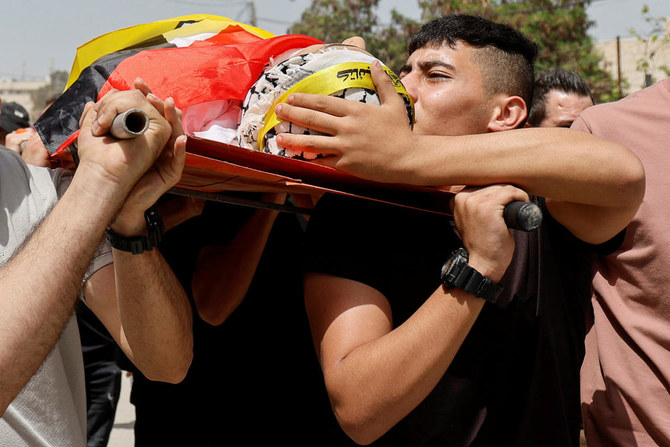
- Israeli police said “hits were identified” when forces responded to stone-throwing with gunfire
- The Palestinian health ministry said Khaled Raed Arouq was shot in the chest and “martyred by the occupation’s live bullets“
RAMALLAH, Palestinian Territories: Palestinian officials said Israeli forces killed a 16-year-old boy during a raid in the West Bank city of Ramallah early on Thursday.
Israeli police said “hits were identified” when forces responded to stone-throwing with gunfire but did not directly address the allegation.
The Palestinian health ministry said Khaled Raed Arouq was shot in the chest and “martyred by the occupation’s live bullets.”
Palestinian official news agency Wafa said Arouq died after being “shot by Israeli gunfire” early on Thursday morning.
Israeli forces carry out regular raids on towns and cities in the occupied West Bank and violence has soared in the Palestinian territory since the war in Gaza broke out on October 7.
Wafa said Israeli military vehicles stormed the city and “confrontations broke out between citizens and the occupation forces, who fired live bullets and stun grenades.”
It said Israeli forces were stationed in several neighborhoods and raided a house in Al-Bireh to the northeast.
Israeli police said: “Terrorists threw stones at the forces operating in the area, the forces responded with gunfire, and hits were identified.”
The police said they made several arrests and that Israeli forces did not suffer any casualties.
The army did not immediately respond to AFP’s request for comment.
Later on, Thursday, mourners carried Arouq’s body wrapped in the flag of Fatah, the political party of Palestinian president Mahmud Abbas, in his hometown of Jenin where he was buried.
“He was hit by a bullet in his back, which exited through his chest...They assassinated him in cold blood,” Majed Arqawi, cousin of Arouq, told AFP.
Wafa said Arouq’s father was an officer in the Palestinian military intelligence service.
Israel has occupied the West Bank since 1967 and at least 488 Palestinians have been killed by Israeli troops or settlers there since October 7, according to Palestinian officials.
At least 19 Israelis have been killed in attacks by Palestinians in the same period, according to official Israeli figures.
Hezbollah denies Israel claim it killed half of commanders in south
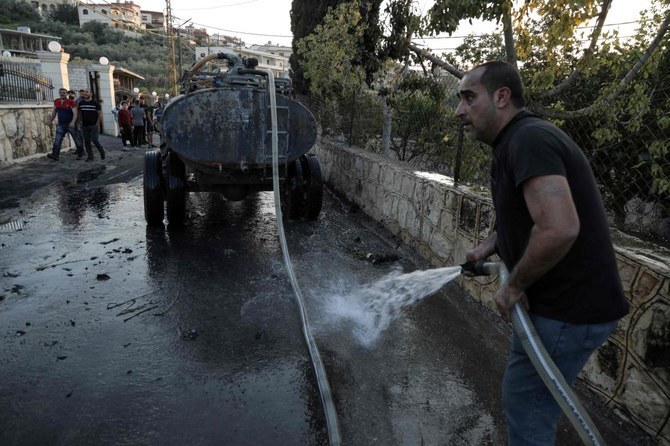
- The number of slain Hezbollah members who “hold a certain level of responsibility does not exceed the number of fingers on one hand“
- Gallant’s claim was “untrue and baseless”
BEIRUT: Hezbollah denied on Thursday an Israeli claim that it had killed half of the Iran-backed Lebanese group’s commanders in the south of the country, saying only a handful were slain.
The Lebanese group has been exchanging near-daily fire with the Israeli army since the day after its Palestinian ally Hamas carried out an unprecedented attack on Israel on October 7.
Israel’s Defense Minister Yoav Gallant said on Wednesday that “half of Hezbollah’s commanders in southern Lebanon have been eliminated” in the months of cross-border violence sparked by the Israel-Hamas war in Gaza.
“The other half are in hiding and abandoning the field to IDF (Israeli army) operations,” he added, without specifying how many.
A Hezbollah source who spoke on condition of anonymity rejected the claim.
The source told AFP that the number of slain Hezbollah members who “hold a certain level of responsibility does not exceed the number of fingers on one hand.”
The source said Gallant’s claim was “untrue and baseless” and designed to “raise the morale of the collapsed (Israeli) army.”
Israel has frequently claimed to have killed local Hezbollah commanders in targeted strikes, but the group has only confirmed a few were high-level members, referring to the rest as fighters in their statements.
Since October 8, the day after the Hamas attack on southern Israel, at least 380 people have been killed in Lebanon, including 252 Hezbollah fighters and dozens of civilians, according to an AFP tally.
Israel says 11 soldiers and eight civilians have been killed on its side of the border.
Tens of thousands of people have been displaced on both sides.
Both sides have stepped up attacks this week, with Hezbollah increasing rocket fire on military bases, while Gallant said in his latest remarks the army had carried out “offensive action” across southern Lebanon.
The Israeli military also said on Wednesday that it had struck 40 Hezbollah targets in Lebanon’s south.
Hezbollah leader Hassan Nasrallah has said his group had some 100,000 “trained” and “armed” fighters, but analysts say this number is likely inflated.




